SpringMVC的搭建和详细配置
Posted 肖帆咪
tags:
篇首语:本文由小常识网(cha138.com)小编为大家整理,主要介绍了SpringMVC的搭建和详细配置相关的知识,希望对你有一定的参考价值。
创建项目
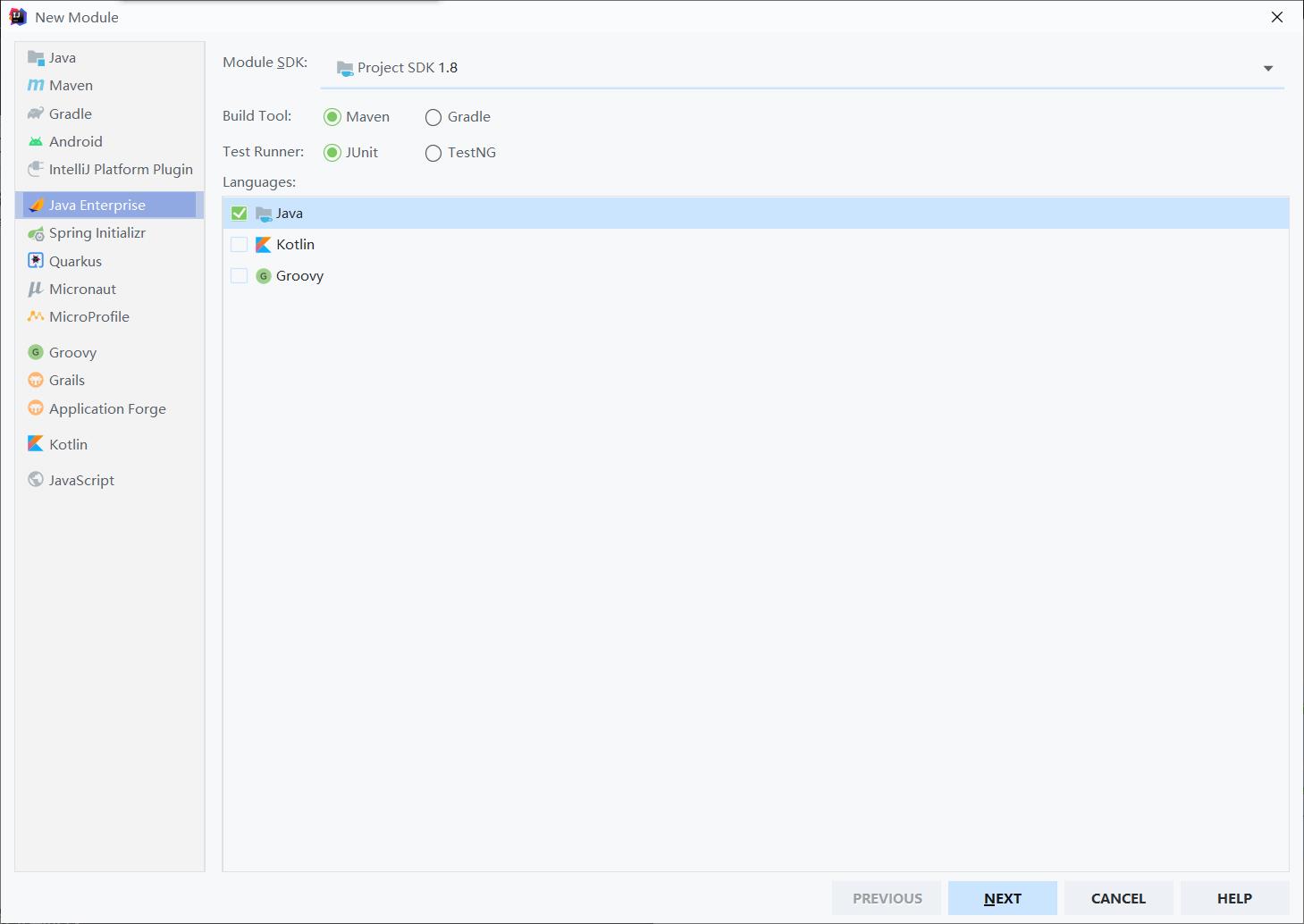
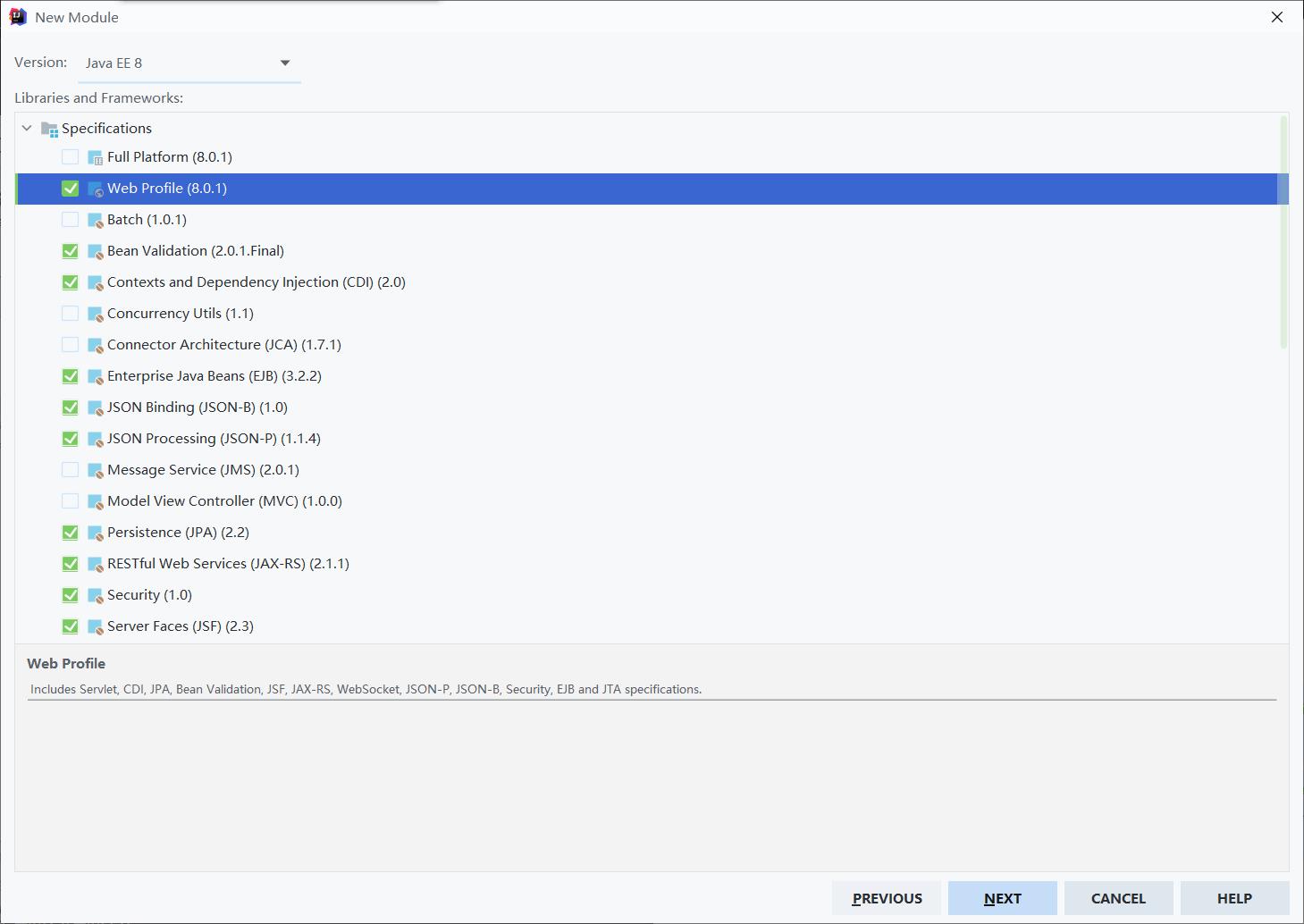
进行配置
1.pom.xml导包
<dependency>
<groupId>org.springframework</groupId>
<artifactId>spring-webmvc</artifactId>
<version>5.2.2.RELEASE</version>
</dependency>
<!-- https://mvnrepository.com/artifact/javax.servlet/jstl -->
<dependency>
<groupId>javax.servlet</groupId>
<artifactId>jstl</artifactId>
<version>1.2</version>
</dependency>
2.在webapp下的web.xml中配置web.xml
<?xml version="1.0" encoding="UTF-8"?>
<web-app xmlns="http://xmlns.jcp.org/xml/ns/javaee"
xmlns:xsi="http://www.w3.org/2001/XMLSchema-instance"
xsi:schemaLocation="http://xmlns.jcp.org/xml/ns/javaee http://xmlns.jcp.org/xml/ns/javaee/web-app_4_0.xsd"
version="4.0">
<!--
配置Spring中核心请求转发servlet
由此servlet对请求进行拦截处理
-->
<servlet>
<servlet-name>springmvc</servlet-name>
<servlet-class>org.springframework.web.servlet.DispatcherServlet</servlet-class>
<init-param><!--init 方法读取参数-->
<param-name>contextConfigLocation</param-name>
<!--读取spring文件-->
<param-value>classpath:spring.xml</param-value>
</init-param>
<load-on-startup>0</load-on-startup><!--服务器启动创建servlet对象-->
</servlet>
<!--请求映射-->
<servlet-mapping>
<servlet-name>springmvc</servlet-name>
<!--配置所有请求都进入DispatcherServlet进行处理-->
<url-pattern>/</url-pattern>
</servlet-mapping>
</web-app>
3.先在java下创建包,再在resource下创建spring.xml
<?xml version="1.0" encoding="UTF-8"?>
<beans xmlns="http://www.springframework.org/schema/beans"
xmlns:xsi="http://www.w3.org/2001/XMLSchema-instance"
xmlns:context="http://www.springframework.org/schema/context"
xmlns:aop="http://www.springframework.org/schema/aop"
xmlns:tx="http://www.springframework.org/schema/tx"
xmlns:mvc="http://www.springframework.org/schema/mvc"
xsi:schemaLocation="http://www.springframework.org/schema/beans
https://www.springframework.org/schema/beans/spring-beans.xsd
http://www.springframework.org/schema/context
http://www.springframework.org/schema/context/spring-context.xsd
http://www.springframework.org/schema/aop
http://www.springframework.org/schema/aop/spring-aop.xsd
http://www.springframework.org/schema/tx
http://www.springframework.org/schema/tx/spring-tx.xsd
http://www.springframework.org/schema/mvc
http://www.springframework.org/schema/mvc/spring-mvc.xsd">
<!--开启注解扫描-->
<context:component-scan base-package="com.wyf.ssm"></context:component-scan>
<!--开启springmvc注解-->
<mvc:annotation-driven></mvc:annotation-driven>
</beans>
4.配置tomcat,创建controller类,并测试
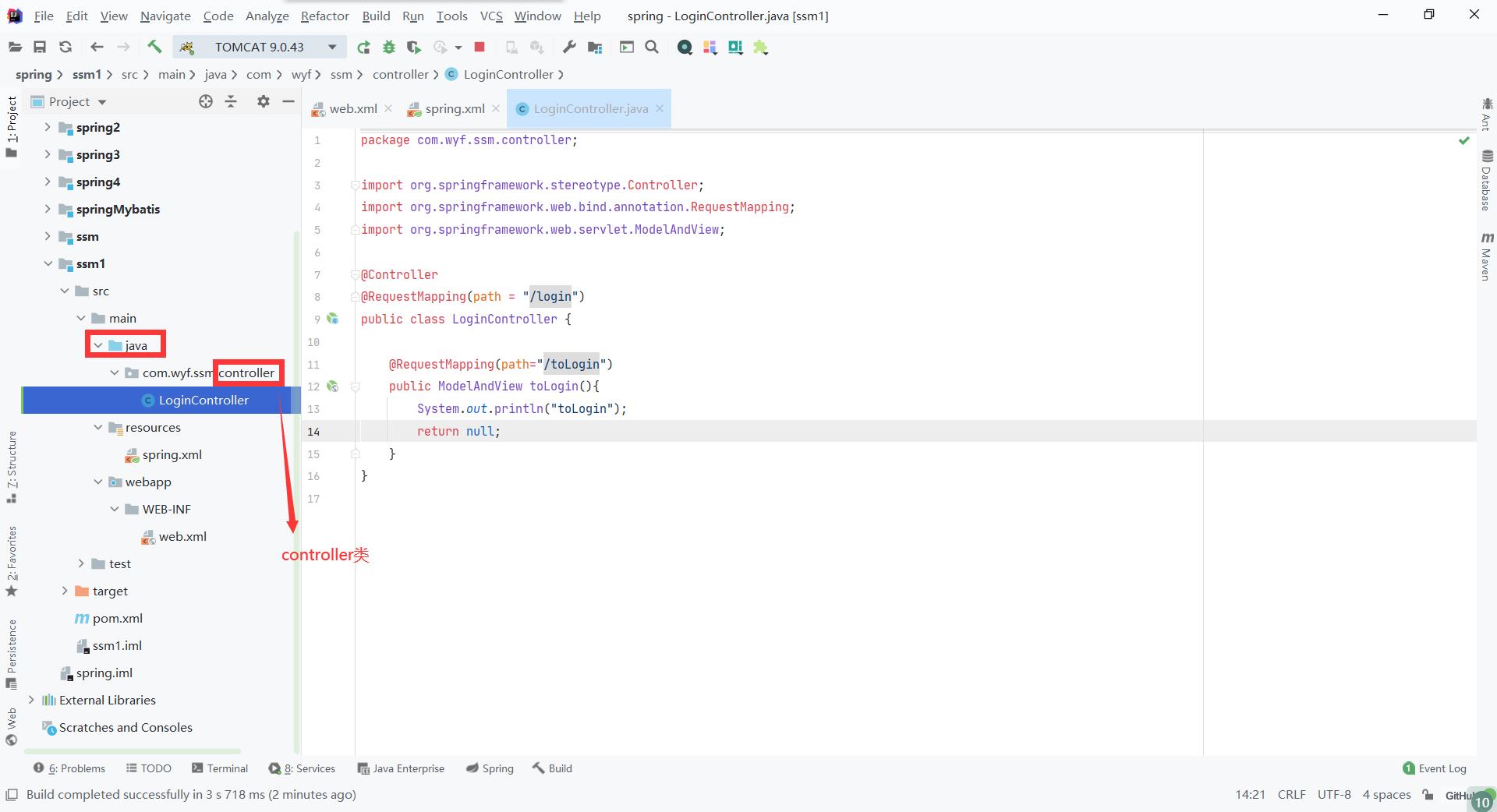
创建loginController
package com.wyf.ssm.controller;
import org.springframework.stereotype.Controller;
import org.springframework.web.bind.annotation.RequestMapping;
import org.springframework.web.servlet.ModelAndView;
@Controller
@RequestMapping(path = "/login")
public class LoginController
@RequestMapping(path="/toLogin")
public ModelAndView toLogin()
System.out.println("toLogin");
return null;
5.访问页面
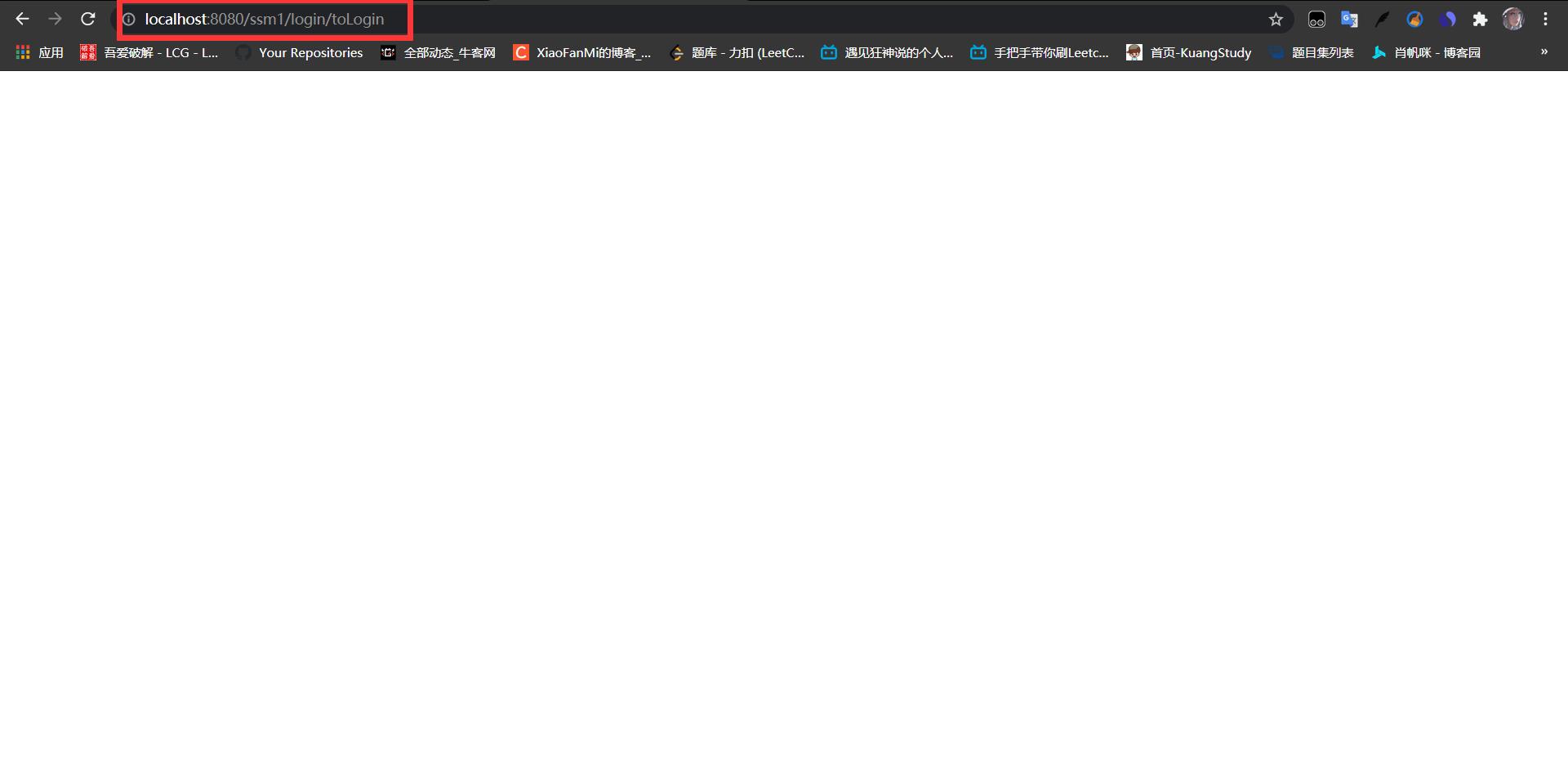
输出成功
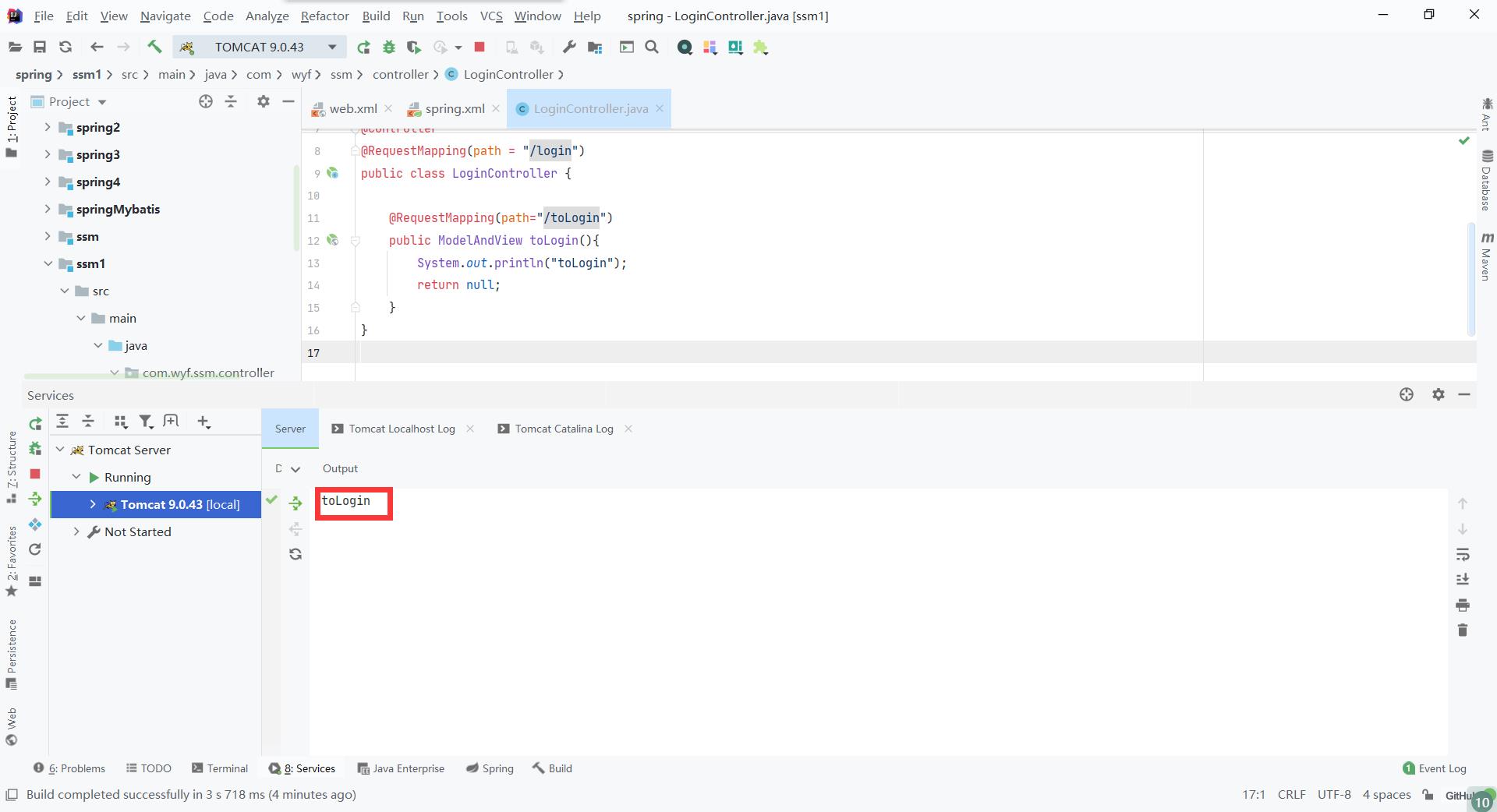
配置视图解析器,通过请求跳转到相应的jsp页面
1.我们希望请求发出后跳转到一个jsp页面,在loginController写我们需要跳转的页面
package com.wyf.ssm.controller;
import org.springframework.stereotype.Controller;
import org.springframework.web.bind.annotation.RequestMapping;
import org.springframework.web.servlet.ModelAndView;
@Controller
@RequestMapping(path = "/login")
public class LoginController
@RequestMapping(path="/toLogin")
public ModelAndView toLogin()
//视图名,springmvc通过视图解析器查找jsp
ModelAndView mv = new ModelAndView("login");
mv.addObject("name","jim");//通过 addObject() 可以向页面传输数据
return mv;
2.在webapp下的WEB_INF下创建一个jsp文件夹专门存放jsp文件
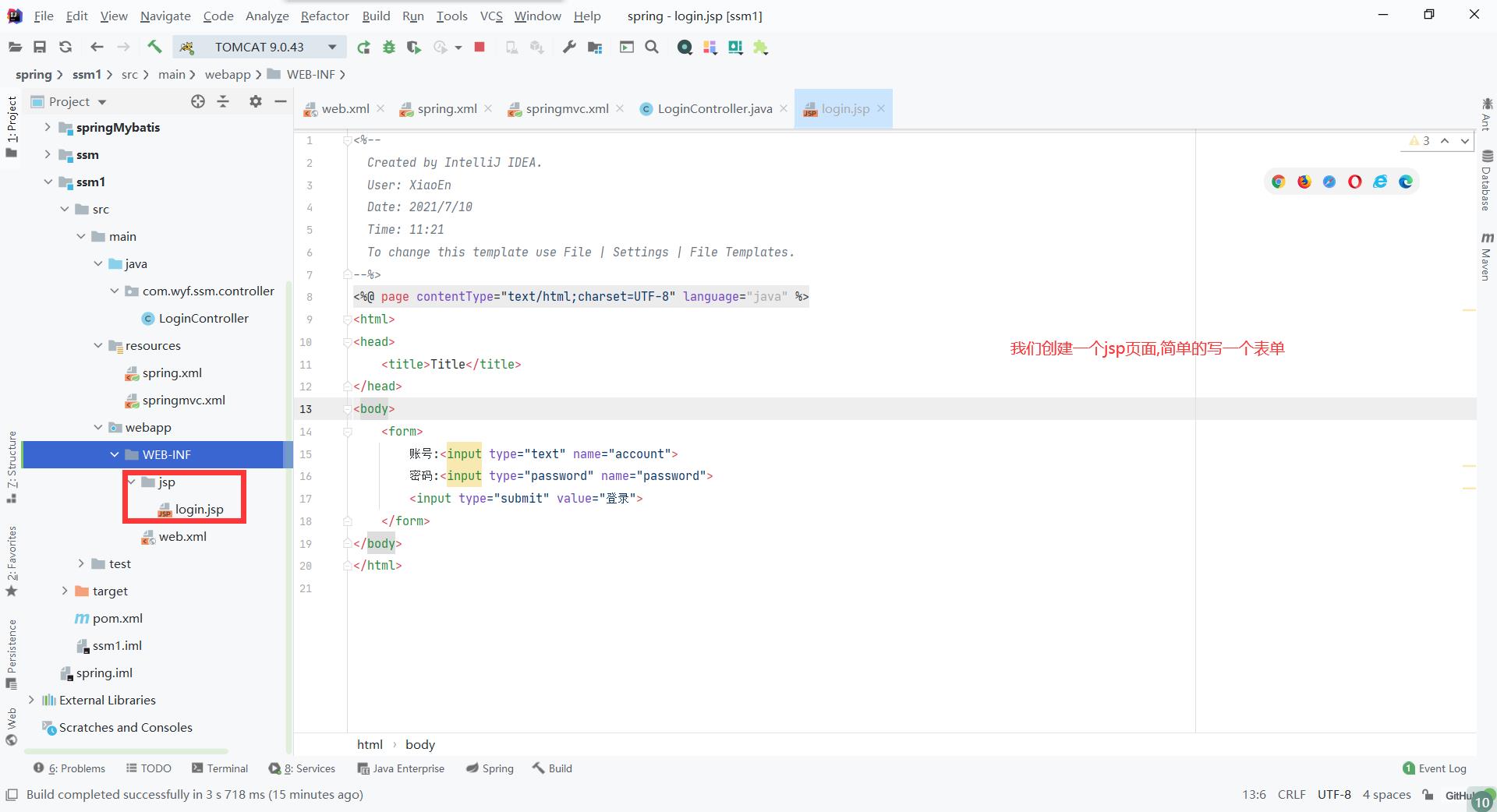
3.创建一个springmvc.xml文件专门存放关于mvc的配置,在spring.xml中导入此文件
<!--导入springmvc.xml-->
<import resource="classpath:springmvc.xml"></import>
<?xml version="1.0" encoding="UTF-8"?>
<beans xmlns="http://www.springframework.org/schema/beans"
xmlns:xsi="http://www.w3.org/2001/XMLSchema-instance"
xmlns:context="http://www.springframework.org/schema/context"
xmlns:aop="http://www.springframework.org/schema/aop"
xmlns:tx="http://www.springframework.org/schema/tx"
xmlns:mvc="http://www.springframework.org/schema/mvc"
xsi:schemaLocation="http://www.springframework.org/schema/beans
https://www.springframework.org/schema/beans/spring-beans.xsd
http://www.springframework.org/schema/context
http://www.springframework.org/schema/context/spring-context.xsd
http://www.springframework.org/schema/aop
http://www.springframework.org/schema/aop/spring-aop.xsd
http://www.springframework.org/schema/tx
http://www.springframework.org/schema/tx/spring-tx.xsd
http://www.springframework.org/schema/mvc
http://www.springframework.org/schema/mvc/spring-mvc.xsd">
<!--开启springmvc注解-->
<mvc:annotation-driven></mvc:annotation-driven>
<!--配置视图解析器,这样就可以通过视图名找到对应的jsp-->
<bean class="org.springframework.web.servlet.view.InternalResourceViewResolver">
<property name="viewClass" value="org.springframework.web.servlet.view.JstlView"></property>
<property name="prefix" value="/WEB-INF/jsp/"></property>
<property name="suffix" value=".jsp"></property>
</bean>
</beans>
4.重启服务器测试
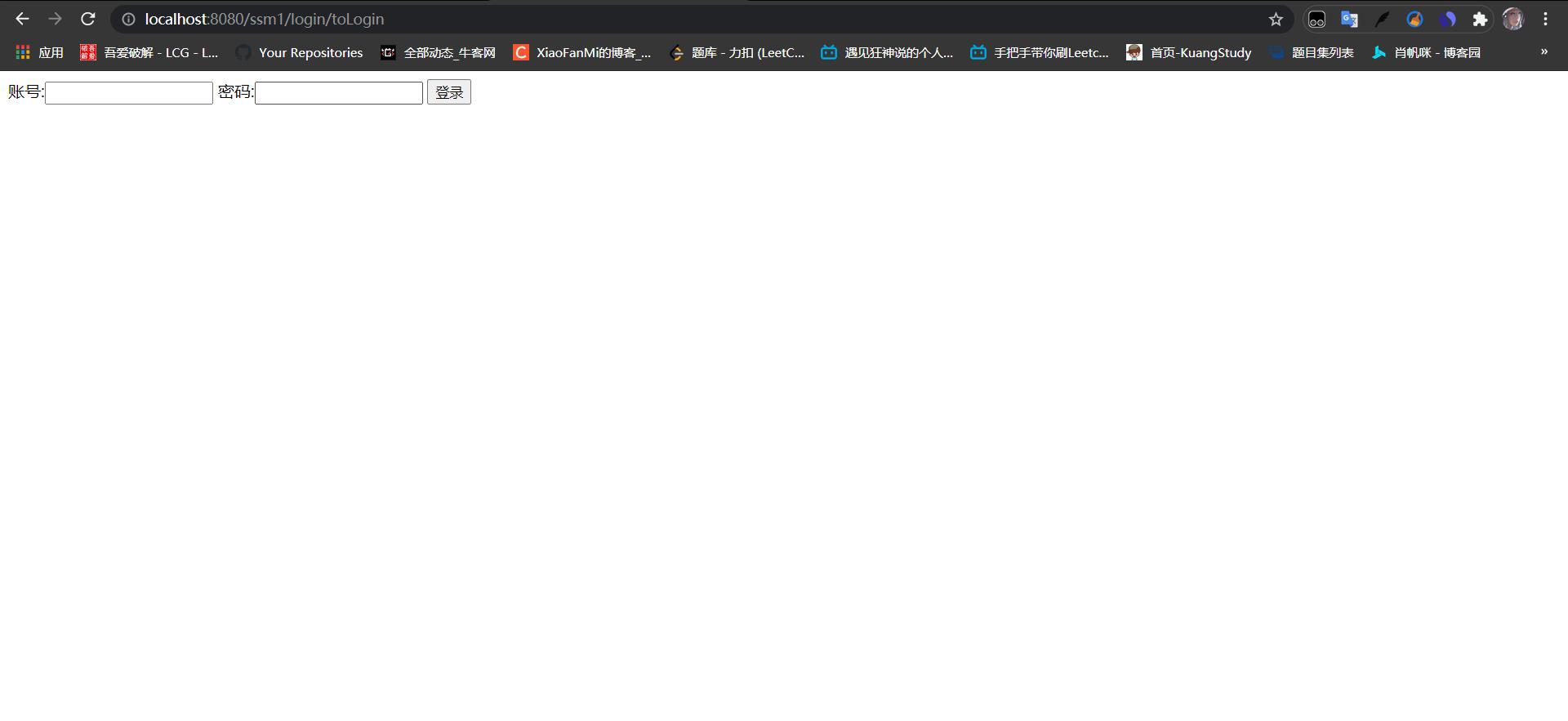
SpringMVC运行流程
在配置了一个简单的项目测试成功后,我们了解一下SpringMVC的运行流程
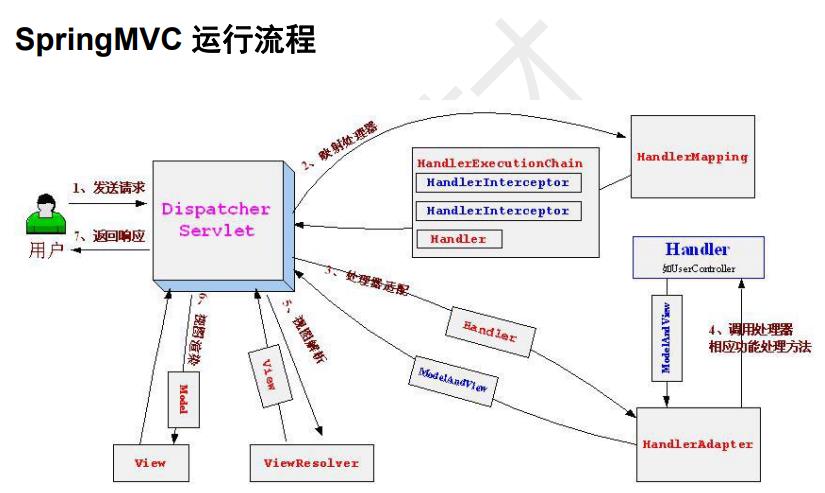
1.浏览器发起请求,通过地址栏(login/toLogin)发起请求,被前端请求分发器(DispatcherServlet)拦截
2.DispatcherServlet 调用HandlerMapping(映射处理器)找到处理器(控制器)将解析的结果返回给DispatcherServlet,如果配置了拦截器,还会调用拦截器
3.DispatcherServlet调用对应的控制器,在到达控制器之前,会先进入HandlerAdapter(处理适配器)参数的封装,数据类型转换
4.最终到我们自己写的控制器接收数据处理返回ModelAndView(包含视图名数据)返回给DispatcherServlet
5.DispatcherServlet将结果交给视图解析器找到对应的jsp文件
6.把Model(数据)交给 view(jsp)
7.由jsp做出最终响应
如何接收jsp发出的请求和数据
我们在进入登录页面后显示一个表单
<%@ page contentType="text/html;charset=UTF-8" language="java" %>
<html>
<head>
<title>Title</title>
</head>
<body>
<form method="post" action="/ssm1/login/login">
账号:<input type="text" name="account">
密码:<input type="password" name="password">
<input type="submit" value="登录">
</form>
</body>
</html>
LoginController里添加表单请求方法
package com.wyf.ssm.controller;
import org.springframework.stereotype.Controller;
import org.springframework.web.bind.annotation.RequestMapping;
import org.springframework.web.servlet.ModelAndView;
@Controller
@RequestMapping(path = "/login")
public class LoginController
@GetMapping(path="/toLogin")
public ModelAndView toLogin()
//视图名,springmvc通过视图解析器查找jsp
ModelAndView mv = new ModelAndView("login");
mv.addObject("name","jim");//通过 addObject() 可以向页面传输数据
return mv;
/*
* @RequestMapping(path="/login") get请求和post请求都可以
* @GetMapping 只适应get请求
* @PostMapping 只适应post请求
* */
@PostMapping(path="/login")
//如何获取jsp页面传过来的数据,需要和表单中的name名必须相同
//也可以通过框架的自动封装,将数据封装到一个对象中,先保证表单中的name与对象的属性名一致
public ModelAndView login(String account , String password)
ModelAndView mv = null;
if(account.equals("admin") && password.equals("111"))
mv = new ModelAndView("success");
mv.addObject("account",account);
return mv;
如果成功跳转到success.jsp
<%@ page contentType="text/html;charset=UTF-8" language="java" %>
<html>
<head>
<title>Title</title>
</head>
<body>
登陆成功$account
</body>
</html>
测试
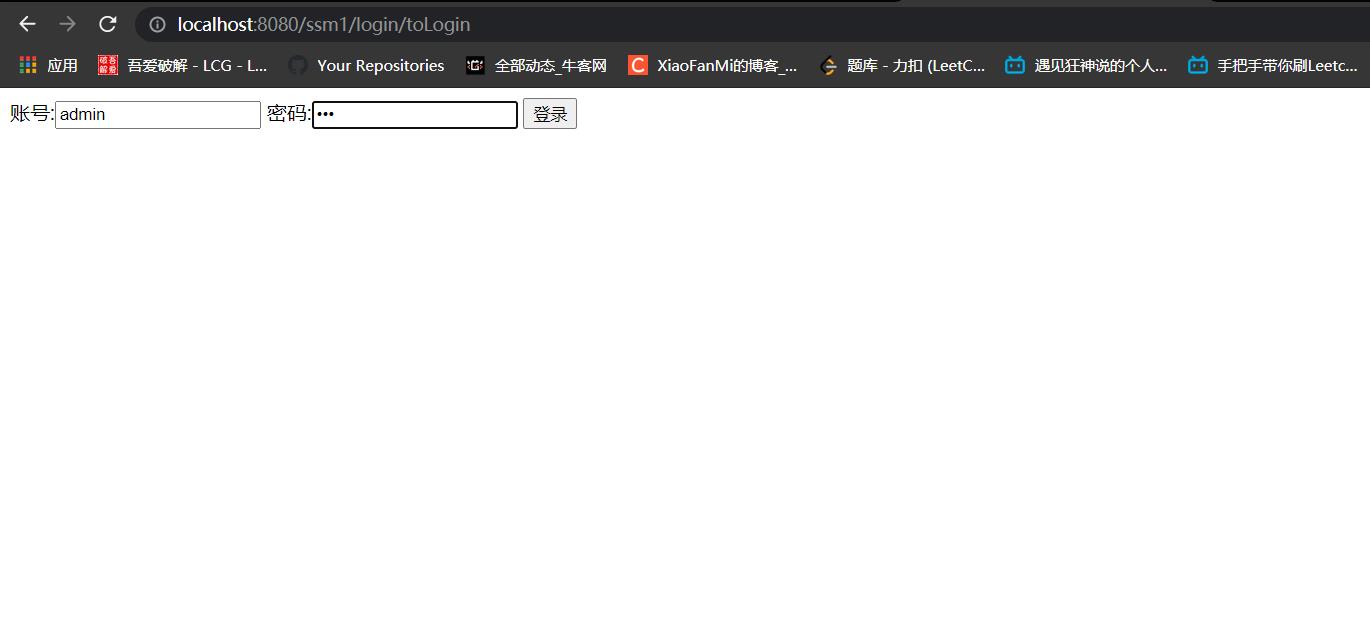
成功跳转
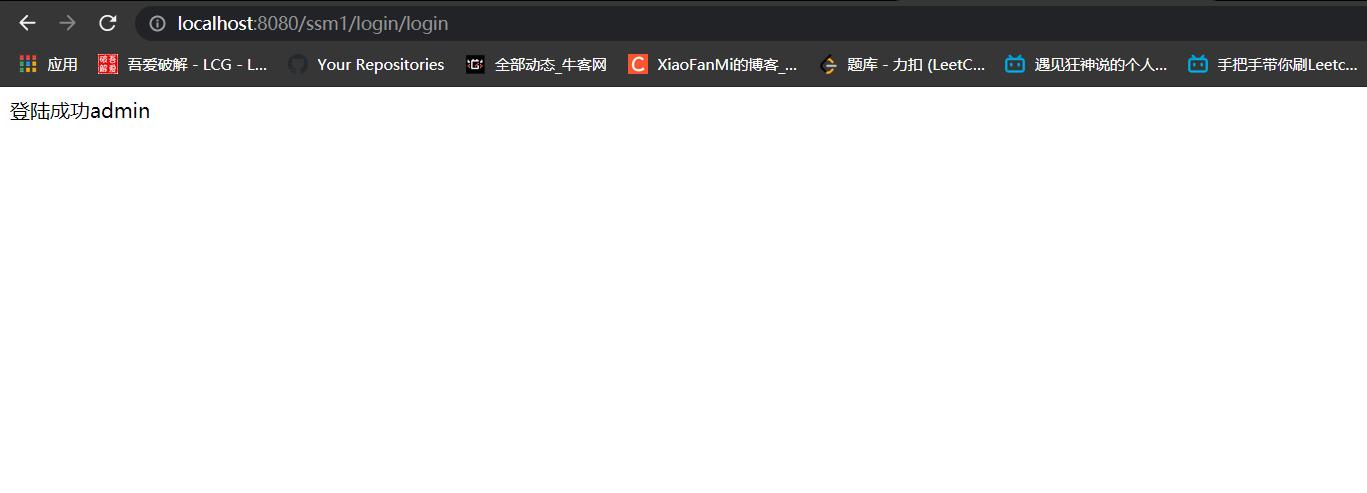
添加过滤器
在登录界面添加了一张照片但是显示不出来,是为什么呢
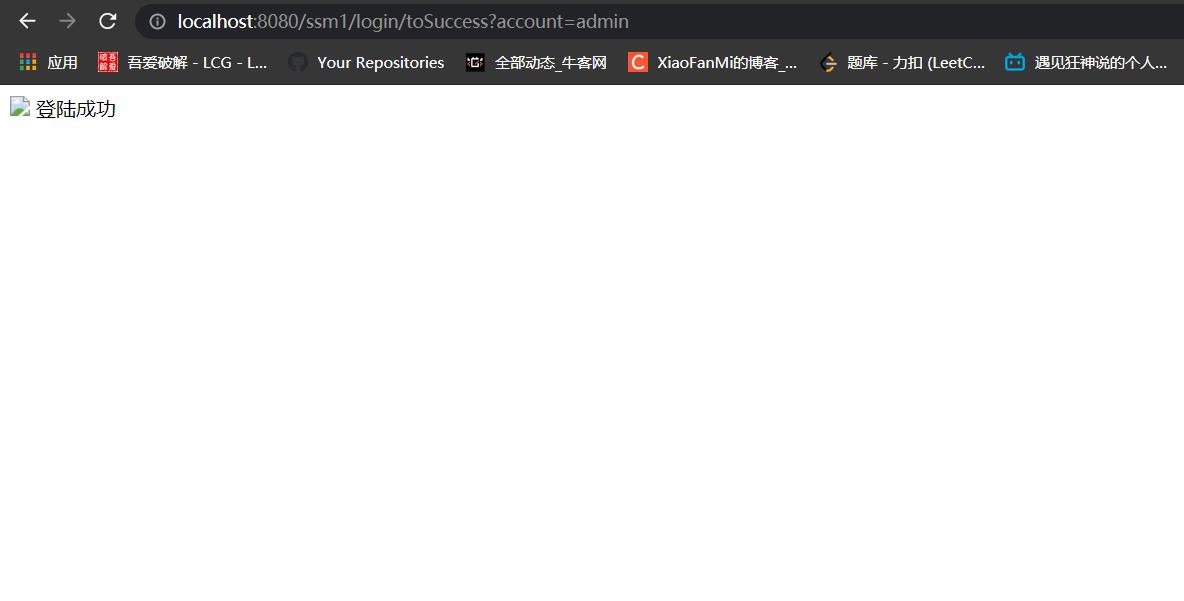
因为请求都会进入DispatcherServlet进行处理
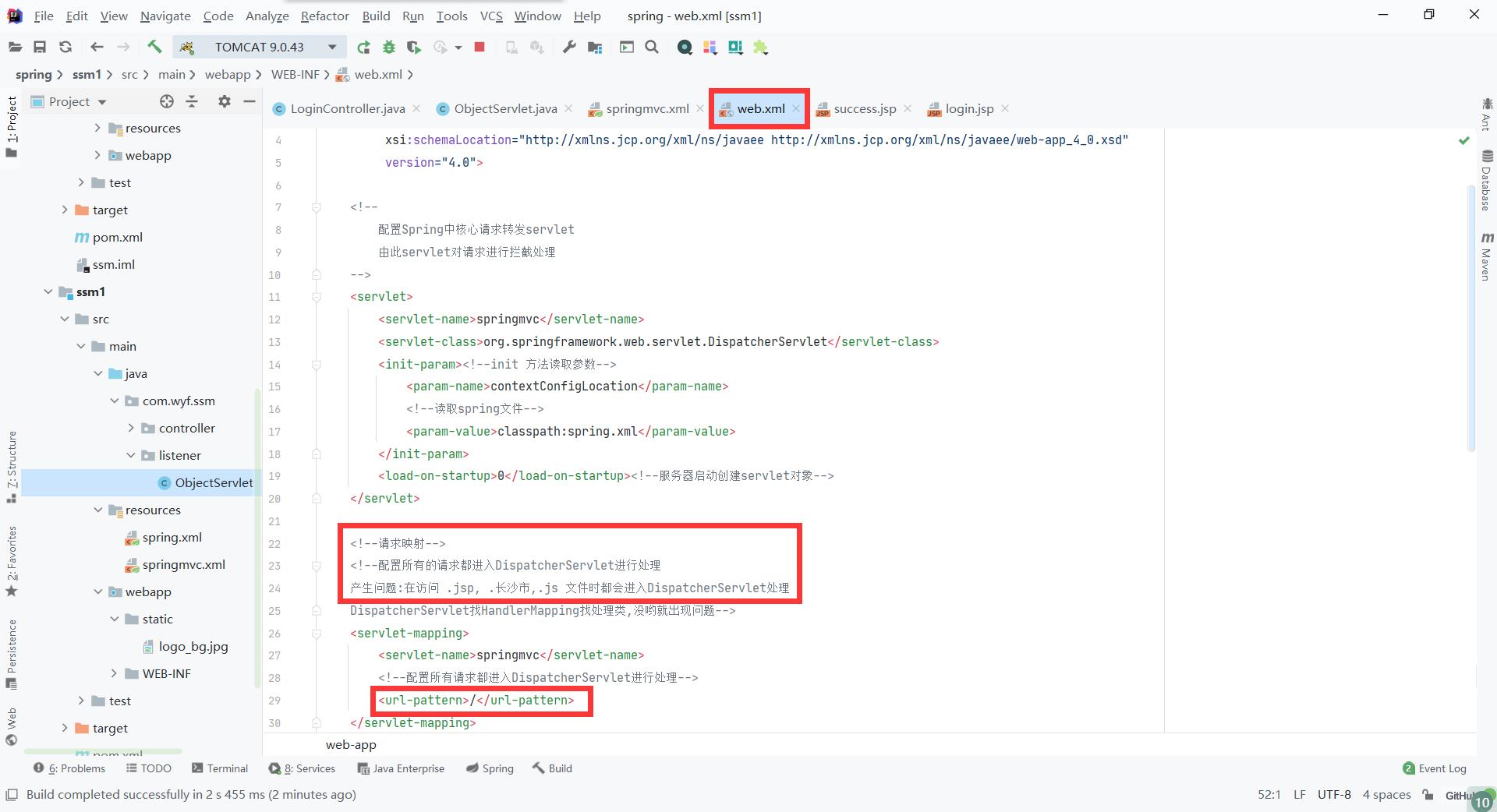
解决方法:在springmvc.xml中添加配置
<!--进行检测,拦截.jsp .css .js这些文件不进入DispatcherServlet-->
<mvc:default-servlet-handler/>
解决编码问题:在web.xml中添加编码过滤器
<!--编码过滤器-->
<filter>
<filter-name>characterEncodingFilter</filter-name>
<filter-class>org.springframework.web.filter.CharacterEncodingFilter</filter-class>
<init-param>
<param-name>encoding</param-name>
<param-value>UTF-8</param-value>
</init-param>
</filter>
<filter-mapping>
<filter-name>characterEncodingFilter</filter-name>
<url-pattern>/*</url-pattern>
</filter-mapping>
解决绝对路径问题:创建监听器
package com.wyf.ssm.listener;
import javax.servlet.ServletContext;
import javax.servlet.ServletContextEvent;
import javax.servlet.ServletContextListener;
import javax.servlet.http.HttpSessionEvent;
import javax.servlet.http.HttpSessionListener;
/*
监听器:监听servletContext.HttpSession和ServletRequest等域对象的创建和销毁事件
servletContext:生命周期开始服务器启动,结束于服务器关闭
HttpSession:开始于会话创建,结束于1.服务器关闭 2.30分钟未操作 3.强制销毁
ServletRequest:开始于请求,结束于服务器向客户端做出响应
*/
public class ObjectServlet implements ServletContextListener
@Override
public void contextInitialized(ServletContextEvent sce)
ServletContext context = sce.getServletContext();
context.setAttribute("path",context.getContextPath());
@Override
public void contextDestroyed(ServletContextEvent servletContextEvent)
在web.xml中配置
<!--监听器定义绝对路径path-->
<listener>
<listener-class>com.wyf.ssm.listener.ObjectServlet</listener-class>
</listener>
测试
<img src="$path/static/logo_bg.jpg" />

Ajax返回JSON
@responseBody 注解的作用是将 controller 的方法返回的对象通过适当的转换器转换为指定的格式之后,写入到 response 对象的 body 区,通常用来向异步请求返回 JSON 数据。
1.添加jar包
<dependency>
<groupId>com.fasterxml.jackson.core</groupId>
<artifactId>jackson-databind</artifactId>
<version>2.9.1</version>
</dependency>
2.写一个页面已ajax的方式发送请求
<%@ page contentType="text/html;charset=UTF-8" language="java" %>
<!DOCTYPE html>
<html>
<head>
<meta charset="utf-8">
<title>Title</title>
<script src="$path/static/js/jquery.1.8.3.min.js"></script>
<script type="text/javascript">
function save()
$.post("$path/login/save", $("#formId").serialize(), function (res)
console.log(res);
if (res.code == 200)
alert(res.msg);
alert(res.data);
location.reload();
else
alert(res.msg);
);
</script>
</head>
<body>
<form id="formId">
<input type="text" name="name" id="name">
<input type="text" name="age" id="age">
<input type="button" value="登录" onclick="return save()">
</form>
</body>
</html>
3.在控制器写一个方法接收数据并返回结果
@ResponseBody注解标签 默认返回json格式
@PostMapping(path = "save")
@ResponseBody //默认返回json格式
public Map save(String name, int age)
Map map = new HashMap();
try
System.out.println(10/0);
map.put("code","200");
map.put("msg","操作成功");
map.p以上是关于SpringMVC的搭建和详细配置的主要内容,如果未能解决你的问题,请参考以下文章